Leadership, Purpose, Innovation, And Tech For Good With Marga Hoek
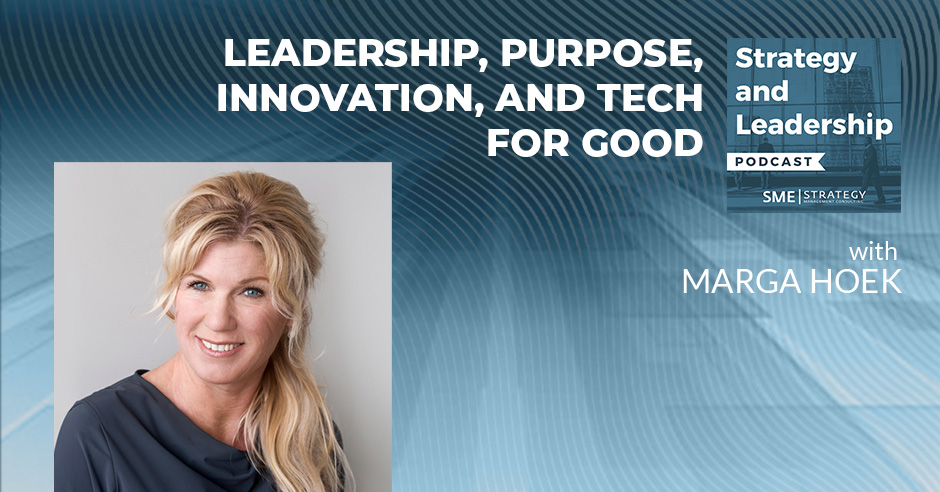
We hear a lot of dystopian narratives around the rapid advancement of technology in this day and age, but we seldom take a pause to reflect on the good things that come with this evolution. Can today’s technology be leveraged as a force for good? In this episode, we dive into the world of purpose-driven leadership and sustainable innovation as Anthony Taylor engages in a thought-provoking conversation with Marga Hoek, a global thought leader on sustainable business and author of Tech for Good: Imagine Solving the World's Greatest Challenges. Among other things, Marga shares insights on leveraging the fourth Industrial Revolution for positive change. Discover the power of purpose, imagination, and collaboration in reshaping our future, and learn how technology can be harnessed to create a world where business becomes a force for good. Tune in for a visionary episode that challenges the status quo and inspires hope for a more sustainable and impactful tomorrow.
Listen on Spotify: https://open.spotify.com/episode/1n7df8RJXJPjPZOoVY9emE?si=75ac1b6672c642d3
Listen on Apple Podcasts: https://podcasts.apple.com/ca/podcast/leadership-purpose-innovation-and-tech-for-good-with/id1202449526?i=1000638170487
Are you ready to create a strategic plan with your team to get everyone on the same page and make real progress towards your goals? SME Strategy can help. Learn more about strategic planning facilitation.
---
Watch the episode here
Listen to the podcast here
Leadership, Purpose, Innovation, And Tech For Good With Marga Hoek
My guest is Marga Hoek. She is the Author of Tech For Good: Imagine Solving the World's Greatest Challenges. That's part of her work. She's a three-time CEO and a board member. She advises, speaks, and does tons of cool stuff. She's calling from the Netherlands. Marga, how are you?
I'm great, and thanks for having me on your show.
It's my pleasure looking at all of the different cross sections of the industry that you work in and you have worked in. It's cool. I love to see the edge of what you are working on, as in what's coming up next isn't even known. I'm looking forward to hearing your perspectives on how you see the world of technology, people, and making an impact. I’m grateful to have you here. Can you tell our readers a little bit about you, your background, and how you got to where you are, and then we will get into a chat?
I'm on a journey. We keep innovating and reinventing ourselves, which is important because, as humans, we want to continuously grow and learn. I tend to look at my life and career in phases. The first phase in my life after graduating and my first job was when I became a CEO. I did that because I thought it was a great pleasure to be able to be privileged, come up with a vision for a company in the broader world, lead it, execute your vision, and see if that works in practice and what it brings you.
It's great to work with a management team and the wider workforce of the company and bring something inspiring other than the balance sheet. I have done that mainly in the construction and the real estate sector, which was a special thing. There was barely any woman in that sector, let alone a woman that's leading the company. It never bothered me in any way. I never had problems in any way. It was a privilege.
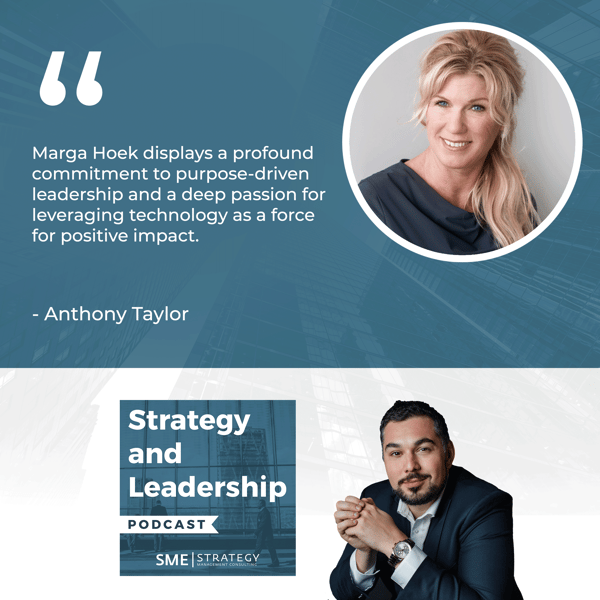
Throughout those roles in that sector, I found out that it's rewarding in many ways as a leader to lead a company, not only for the self-interest of that company, but to have a leadership style that makes the company contribute to ecological, social, and governance challenges. As a business, you are not part of the problem in the sense of polluting, taking resources, and damaging in any way, but to be the opposite and be a force for good. That caught me on in my leadership period.
Let me give you a simple example. As the CEO of a construction company, you come to the construction site where everything happens. I noticed that a lot of what I called resources, what back then was called waste, was being taken away from the construction site by another company. I had to pay that company for it. I thought, “This is weird. We are throwing stuff away that's valuable goods because they look like metal, wood, and stones. I have to pay another company. They are going to make money on it. What are they going to do with it? Is it going to be burned? Is it going to be disposed of in landfills?”
That was one of the first times that I thought, “I'm going to set up a company and do this stuff myself. Let's recycle all those materials, bring them back in, and see how we can collaborate with other parties that know how to upscale waste into resources again.” I'm telling this like a simple thing, which wasn't, but when we set that up, imagine that a new company that was recycling construction materials grew faster than the other business units.
We keep innovating and reinventing ourselves.
It wasn't volatile because you can imagine real estate planning and development is quite a volatile and risky business. It was a stable business. It wasn't volatile. We had a great platform with partners to do it with after a while. First, we did it only for our own company. It was a division that supplied our divisions. In a short time, it was also working with other companies and growing external clients. In the end, it outperformed all of the rest.
You can tell me it’s an idea of scale, how big it was the construction company, and how big the upcycling company got in terms of people or revenues.
With the revenues, I can't precisely remember, but in terms of people, it was in the whole of the company. There were 2,500 people working in the company. In the recycling business, it was less. We had less people to do a bigger job because we did it via partnering and not only by having everybody on our payroll but also in terms of percentages of turnover. It started at 2%, and it ended up at 35% of the total. That's significant.
I give this example because everybody can relate to it. Sometimes, things are simple and not complex. I did that and many other things. We build houses and other buildings. At that time, it was said, “You have to diminish your footprint. Reduce the carbon emissions needed for the fossil energy used in the life cycle of those houses and buildings.” I said, “We can do that in a different way. Let's see what we can grasp together in terms of technologies and where we end up.” Early on, we had zero-emission houses, and by now, we have positive impact houses that are CO2 negative instead of C2 positive.
All those are kinds of things I did, and I was asked. The second phase of my career was to set up and lead the Dutch Sustainable Business Association, which later on internationalized to lead the dialogue between businesses and governments because it's like playing a new game with old rules. Everybody knows that doesn't work. Our tech system, for instance, Texas labor instead of resources and pollution, which is crazy because you get what you reward, and we get the wrong thing. I worked on that for a long time.
In that role, I had the privilege, with over 400 member companies, to see many businesses in many different sectors. That motivated me to write my first book because I saw all the pieces of the puzzle. I can make the puzzle, but many people see only a couple of parts of the puzzle and are not able to complete the puzzle. Let me do that and share those ideas and those overarching insights and vision. The next book was The Trillion Dollar Shift because, by that time, the sustainable development goals had been set in 2015. I thought, “This is a hugely important and great opportunity. Let me write my first international book on that.”
That’s one of the things that I heard in terms of looking at your mantra and approach. You are running this construction company. Having to deal with the things of a woman leading a construction company won't get into this show. You saw this opportunity internally and turned it into a great business but recognized that you didn't have to do everything.
>> Read more: Fostering Effective Team Communication
Your next business was to get people to the table. It sounds like, in the short amount of time we have been speaking, your gift is being able to put those puzzle pieces together, but the pieces are the people. Your advisory and communication are collaborative to solve problems. I want to talk about that later. My parking lot question is, how did the impact of working, living, being Dutch, and being in the Netherlands impact the ability to drive sustainable solutions because there, compared to North America, it is such a different mindset around how we do it, how we look at waste, and how we look at the use of resources?
From a North American lens that I have, when people are like, “Let's look at carbon.” You have other people who say, “Climate change is a hoax. We have unlimited resources. Don't worry about it.” Culturally, it's fascinating listening to your leadership. It sounds collaborative. Please keep going. 2 books, 1 international book. Near the end of the phase two. Keep going.
Thank you. You made nice bridges. Once I phased out of the business association, both in the Netherlands and globally, I went on to do non-executive roles in boards and chairs, a lot in the financial sector, because I believe in redirecting capital. That's everywhere where the power lies. It lies the responsibility and the opportunity. I found it important to work in that sector. Alongside this, I work consulting and do a lot of keynote speaking. I write books because it's important that we as people continue to learn, share knowledge, gain knowledge, and know more than the obvious.
One of the things that's cool about your career path is you have transcended it into those phases. Looking backward, it's obvious. Looking forward, it’s less obvious. What I heard you do is you looked at an innovation that was a necessity and a need. It was a low-hanging fruit, and you didn't even think about it internally. That's how some of the best company innovations are. They start small because there's an existing need, a great idea, and a great opportunity. For you, the vertical integration made absolute sense.
You have gone through it and your scope is much broader. You are looking and engaging both in your brain and the brains of others to be at the forefront of what's happening in the industry. If we look at this and it's December 2023, and you are looking forward to it, what are some of the things that you are seeing? What are some of the things that are on the top of your mind? What are some of those opportunities that you are in the process of connecting the dots on that you want our readers to think about and to start preparing for potentially?
What drives my mission is to make happen that, as I call it, business for good. That's business that's good for both business and the world, which can be done in a financially positive way. It becomes the norm and not the exception. That's what drives me. That's what I want to see done. If you look at the 100 largest economies in the world by revenue, imagine that 69 are companies and not countries. That's a huge power and capital. If we leverage that in a good way, you know, we can create a better role for everybody. That's my mission.
That's also my red thread through everything that I do. I can advise everyone that it makes life so much easier if you have a purpose because that's my purpose. Looking at that purpose and what's happening around me brought me to write Tech For Good because technology can be our biggest ally in the transition toward a more sustainable society. We don't treat it as such, but it can be. It has the potential to do that.
It makes life so much easier if you have a purpose.
We are at a pivotal moment in time. We are crossing over the threshold of the fourth industrial revolution, which might sound like a buzzword, but it is relevant because it means that we enter an era in which we have both digital and physical technologies, a wide range of solutions that blend into bigger solutions. People are not aware of what technology can do, how broad it is, how many different technologies exist, and how they can help us enormously in this transition that we all should want. Nobody can be against that, but it's more like how we are going to do an action and how we are going to lead through that transition. One topic that is important to me is leveraging fourth industrial revolution technologies for the greater good. That's why I wrote the book.
A thing that is important related to that might sound like a different topic, but it is important, is trust. Technology has the potential to be our biggest ally and can do so many good things. If trust in technology, and I mean not the mechanical technology, trust if technology can do what it's set out to, but trust in the intentions and the parties behind it, relational trust is at an all-time low. We still have a lot of people applying tech with bad intentions, not with ethical intent.
The trust and intentions of people have to change. We have to be more aware. We have little time for huge challenges. We can't waste anything, albeit resources or technology. We have to redirect capital, resources, and technology to contribute, not to damage. That is an important thing on my agenda. I try to contribute as much as I can by writing these books, sharing the vision, and hopefully inspiring many people around the globe. Sometimes, that's big audiences and boards. Whether it's voluntarily or forced upon them, it is locked up in a room for a couple of days with me to help support this movement.
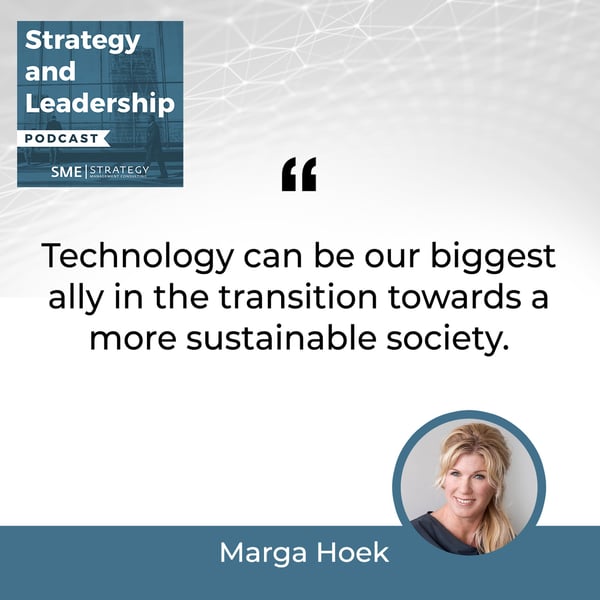
I hear that what you are seeing through your lens is the fourth industrial revolution. It's been a little while since I have studied it, but I do remember there's the agricultural and machining revolution. There was a third and a fourth. They were all technologies. I believe the first three were obvious to most people. You say, “We can plant crops in a way different way. We are going to get a much better yield. We can use coal-powered machines to increase our productivity.”
With these technologies, blockchain, quantum computing, and like anything else that you come behind there, the challenge now is that the speed of change is happening so fast that it is more uncomfortable for folks and the overall social fabric where there is division, uncertainty, and differences in perspectives and realities that are intersecting that it is maybe rightfully slowing down some technological innovation.
As there's so much to learn, it's hard for everybody to be on that same pace, which probably creates the opportunity or ability for more bad actors to fall into it. We don't have that same common societal goal. Everybody is self-interested. I find that interesting. How do you see the intersection of trust and technology? What do our readers need to consider when looking at implementing new technology or the state of trust in the industry?
The trust we create all of us together. Every one of us needs to redirect the role of technology. We all have different roles in that being a consumer, producer, and being in the tech area, or not being in the tech area or government or business. That's a whole ecosystem that we need to direct. It's not easy, but it must be done.
To your point, what you mentioned, the differences between the different industrial revolutions, that's true. Former industrial revolutions were 1, 2, or 3 big things. That's understandable. It was a couple of inventions. You knew what they were going to do, and that was simple. Although the consequences were huge. You only need to think about the globalization of all these supply chains and moving stuff around the globe entirely as a consequence.
We need to perceive things differently because it's a wide range of technologies. It's not even eight technologies. I describe eight in my book, but those are eight technology groups. It's a way of grouping all kinds of technologies. If you only think about robotics, there's not one type of robot. It's a whole spectrum. If you think of virtual reality, it is augmented reality, virtual reality, and a combination of both.
That's one of the reasons why I wrote the book because if I read all these textbooks, it dawned on me and I wanted to write in a simple way and yet authoritative what these technologies are, what the economics look like, and how it can be applied. Most importantly, explain to everyone, “You have this technology. How can it be applied for good? We need to make people more aware. How can they be applied for good?
In most cases, these technologies combine, and multi-tech solutions come about. What do we need to do? I would wish that more business people were truly purpose-driven. This is also becoming a buzzword. Let's talk a little bit about what it is. Being purpose-driven means that you start with the purpose. It's not to do what you did with your company and go to the marketing department and say, “Add a nice purpose to this.” That's not what it is. Although that happens a lot, that's green wishing and becomes greenwashing.
It would be nice if more business people were truly purpose driven.
Being truly purpose-driven is looking at what the authentic, ethical values are that the company has to address any of these sustainable development goals. We have that system of 70 goals, which makes our lives easy because that's the holistic definition of sustainability with a timeline. Start with what is important to you as a person or as a company. What are you going to contribute to? The rest follows, but you start with a purpose, and you look, “We are good in science. We have those kinds of solutions. We have access to those kinds of clients.”
IKEA, things from the perspective, all those consumers come in our stores. We can have a great role in making people more aware that they can be part of a circular economy and they can buy, in our stores, renewable energy solutions. DSM is a former coal mine company in the south of the Netherlands. They transferred first into a bulk chemical company. It’s still not good. They repurposed and thought, “What can we do? It became a science-based solution company for the animal sector, people, health, and food. They brought only people planet plus solutions.
Interface Group is a company in the US that is listed. They have carpet tiles. They said, “We don't want to be neutral.” Neutral is not good because it doesn't solve anything for real. When they went on emission zero and achieved it earlier on, they said, “We want to be part of reversing the damage that has been done to people on the planet.” They came with innovative products like Climate Take Back, which is well branded, and networks, and all kinds of projects where they had a positive impact on the world. There are many more companies that do that. If you are truly purpose-driven, you will also look that way at technology because you will think, “How can technology help solve challenges in the world? How can I combine my business with that to create that synergy?” If we do that, we will get there.
I used to be the chair of a green chamber of commerce, and the belief was, “How can business do those things?” That was several years ago. We had a lot of great Dutch people in that group, and I found the connection interesting. I had never heard of the eight technology sector groups, and you know about them intellectually, but a lot of people bulk them into AI or technology as a whole. Looking at them distinctly will help teams utilize them more, but utilizing them is way down the line.
The other thing that I found interesting about that is that the advancement is desperate, but some people have such a leg up, like the idea of international trade, free trade, or specialization. It’s that different people have specialties. How can you get all those people at the table to use it in the right way?
Going back to technology, there's the like, “If you do well, you will make more money.” The whole positive of what you are saying is you have to start with wanting to do good. The money will come after versus trying to fake it, but true to your core, there are natural opportunities in what you are doing to evolve to do work so long as you and your team begin with the intention of doing good work and seeing what you can do from there. You will have social and people benefits because people want to do good work. You will attract the right people, and you will make money.
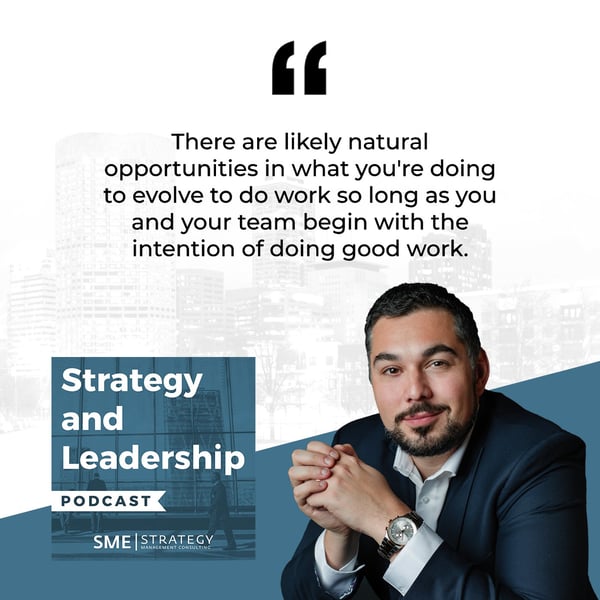
Time flies when you are having fun. We could talk for hours. We only have started. Why don't you give a parting thought to our readers? What do you want them to consider and reflect on as teams, in their teams? Tell people about your book. I'm sure they can get it on the internet somewhere. Maybe we have to have another conversation about trends in the future.
Why did I write this book? If you write a book and after you have finished, the real thought comes to why you did it, because you rise above it and you think, “What is now underlying most important?” That's when I came to the subtitle, which is Imagine and Take for Good Solving the World's Greatest Challenge. Why did I say that? I added a page to every chapter saying to imagine and sketch an image of what people should imagine.
Why did I do that? In this era of doom and gloom, fear, and threats, I feel that people lost the opportunity and ability to imagine what can be done instead of dwelling on what cannot be done. That's important. Start with hope and confidence. Think from challenges. Get technology and be open-minded to collaborate with unsuspected parties. It makes life much nicer if you collaborate with people and organizations you don't know yet. Imagine what can be done and more possibilities will open up to you.
It seems like people have lost the ability to imagine what can be done instead of dwelling on what cannot be done.
Think about coral reefs. Our coral reef will disappear within a decade by 99% if we don't radically change as a result of pollution and climate change. We have 3D printing technologies that are able to restore coral reefs that have gone lost. That's such a beautiful thing because it can be done in such a way that the life underwater and the bio ecosystem believe it's coral reefs. They inhabit it and let it grow. We can restore things. Having said that, we should stop polluting, but we are able to recover things. If we can do that, imagine what we can do more. There's so much that can be done.
With changing generations, Millennials and Generation Z are soon to be the majority of the workforce and the marketplace. They come with a higher sense of purpose than former generations. They are tech savvy or tech native. In other words, they combine those two things much more so than former generations. It is what this book is precisely about, but it also predicts your future. If, as a company, you dare to be purpose-driven and you build a portfolio of products and services aligned with that, you use technology. You have the clients, the employees, the managers, the CEOs, and the investors of the future on your side.
If you dare to be really purpose-driven and build a portfolio of products and services aligned with that purpose, you have the clients, employees, managers, CEOs, and investors of the future on your side.
It's a great consideration for all leadership teams and all individuals as you look at, “What do you want your life and opportunity to be about?” A great takeaway to recognize is that it is not an end-all-be-all because you have demonstrated it. Your life comes in phases. Recognizing that whatever phase you are at is perfect. Marga, thank you so much for being here. Thank you for chatting with me again. I know that we could chat for a longer time, but thank you. It's been a pleasure, and I look forward to the next time.
Thank you.
---
My guest is Margarita Hoek. She has written the book, Tech For Good: Imagine Solving the World's Greatest Challenges. It's a great opportunity to reflect on what you can do. The takeaway that I have from Marga's career is that it didn't come as a home run right away. It was a small incremental change that started with intent and evolved into this tremendous opportunity.
All of us have the power to make a small and large impact quickly. If we can all do that, we can both do good for the planet and people and make money at the same time. It’s the triple bottom line. Marga, thank you for being here. I appreciate it. I hope you enjoyed this episode. Be sure to comment, share, and tell your folks about it so that we can all build a great piece of a puzzle around the world. Thank you for reading. I will see you next time.
Thanks for watching/listening! If you're looking to hire a strategic planning facilitator to get your team on the same page and moving towards the most important goals, reach out to SME Strategy today.
Important Links
About Marga Hoek
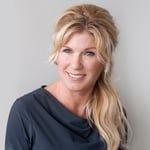
Marga Hoek is a three-time CEO, Chair, and Board Member. Due to her visionary, purpose-driven leadership, Hoek has gained recognition over the years as a global thought leader on sustainable business and capital. She is a multi-golden-awarded bestselling author of the trailblazing titles New Economy Business (2014) and The Trillion Dollar Shift (2018). Fortune praised The Trillion Dollar Shift, which highlights opportunities the UN’s Global Goals hold for business, as “required reading.” Recognized by Thinkers50 for her global management thinking, Marga Hoek coined the slogan "Business for Good" in 2014 to emphasize her mission "to make Business for Good the norm, rather than the exception."


